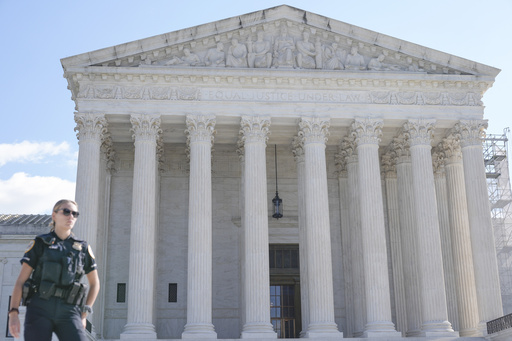WASHINGTON — On Wednesday, the Supreme Court seemed poised to allow Oklahoma death row inmate Richard Glossip another chance to contest his murder conviction and death sentence in what has become a lengthy legal battle.
During the proceedings, the justices engaged in discussions regarding a rare collaboration between Glossip’s legal team and state prosecutors. Both parties urged the Court to overturn the conviction and death penalty, citing the unfair trial that Glossip received.
Meanwhile, the victim’s family members expressed their desire to see Glossip executed, creating a stark contrast with the unusual coalition formed in the courtroom.
Despite the state’s alignment with Glossip, Oklahoma’s top criminal appeals court has consistently upheld both his conviction and sentence. However, after an hour and 45 minutes of arguments, the justices appeared unlikely to support the lower court’s decision.
The Court’s course of action remains uncertain; they could choose to vacate Glossip’s conviction entirely, thereby removing him from death row.
Oklahoma’s Attorney General, Gentner Drummond, attended the session and has acknowledged the trial’s unfairness. He indicated that a retrial for Glossip regarding the 1997 murder of motel owner Barry Van Treese could be on the horizon, although prosecutors had initially alleged that the crime was motivated by a murder-for-hire scheme.
If a retrial were to occur, the death penalty would likely be off the table, according to Oklahoma City District Attorney Vicki Zemp Behenna.
Justice Ketanji Brown Jackson proposed that the justices might direct state courts to hold a new hearing to examine claims regarding suppressed evidence by prosecutors.
It is important to note that the case is being reviewed by eight justices, as Justice Neil Gorsuch has recused himself from participating due to previous involvement in the matter while serving on an appeals court. A potential split decision of 4-4 could end up reaffirming Oklahoma’s court ruling.
Last year, at least five justices voted to halt efforts to execute Glossip while his case was under review. Throughout the trials, Glossip has maintained his innocence. In contrast, Justin Sneed, who pleaded guilty to the robbery and murder of Van Treese, testified against Glossip, claiming that he was offered $10,000 by Glossip to commit the crime. Sneed received a life sentence for his testimony and has been a pivotal witness for the prosecution.
Drummond noted that recent evidence raised significant concerns. Among his primary worries was that prosecutors may have withheld information regarding Sneed’s mental health, information that could have cast doubt on his credibility. Additionally, Drummond highlighted that a box of evidence pivotal for Glossip’s defense had been destroyed.
At least four justices, including Justice Brett Kavanaugh and three of his liberal colleagues, expressed reservations about the reliability of Sneed’s testimony, which they deemed critical to the case. Kavanaugh remarked that the entire case “depended on his credibility,” emphasizing that Sneed had “lied on the stand.” Similarly, Justice Elena Kagan pointed out that the failure of the prosecution to correct false testimony was material to the case.
Justices Samuel Alito and Clarence Thomas appeared to lean toward upholding Glossip’s conviction and death sentence.
The Court is currently examining two significant legal questions: whether Glossip’s rights were violated due to withheld evidence, and whether the decision by the Oklahoma court to maintain the conviction should be upheld in light of the state’s changed stance.
Prosecutors in Alabama and Texas are pursuing new trials for other death row inmates, including Toforest Johnson, Melissa Lucio, and Areli Escobar, in a similar context. In a recent case, the justices denied a last-minute reprieve for Marcellus Williams, who was executed in Missouri just last month.
The Supreme Court had previously blocked Glossip’s execution in 2015 due to a mix-up involving lethal injection drugs and reaffirmed their decision last year. Glossip was originally convicted in 1998, but a subsequent appeal led to a retrial in 2004, where he was convicted again.
Legal representation for Glossip includes former Solicitors General Seth Waxman, while Paul Clement represents Oklahoma before the Supreme Court. Chris Michel, an attorney designated by the court, is defending the Oklahoma ruling supporting Glossip’s death sentence.
Michel also hinted that a restructured state clemency board may be more favorable to Glossip than the previous board, which reached a 2-2 deadlock during their review.
A multitude of states has entered the discussion, urging the Supreme Court to uphold Glossip’s conviction based on their vested interest in maintaining respect for state court rulings.
An anticipated decision from the justices is expected to be unveiled by early summer.


